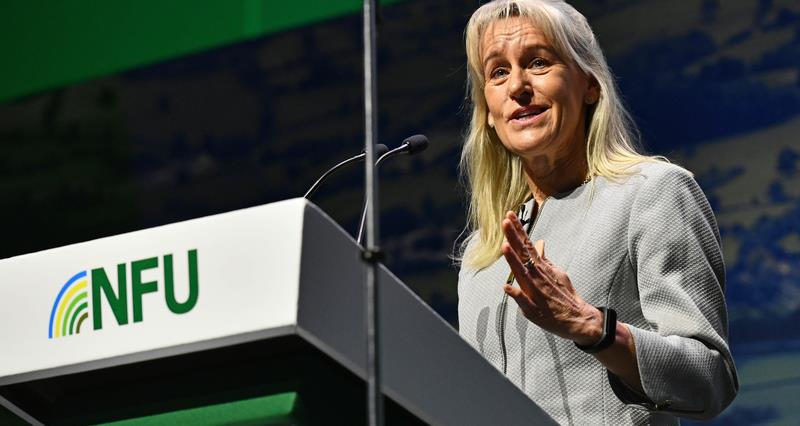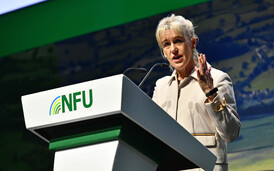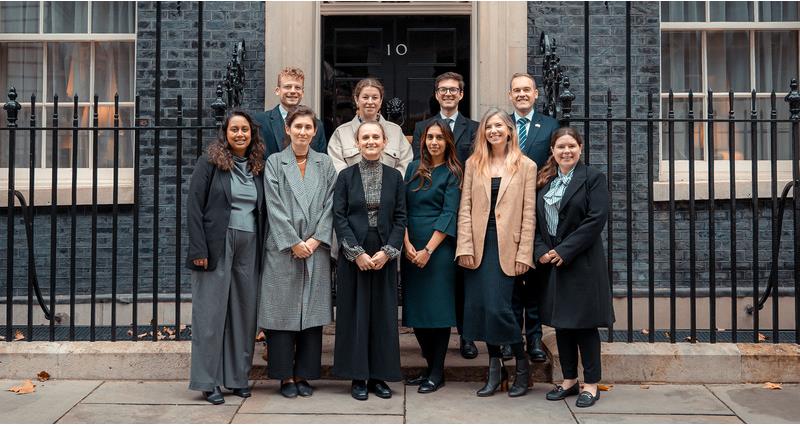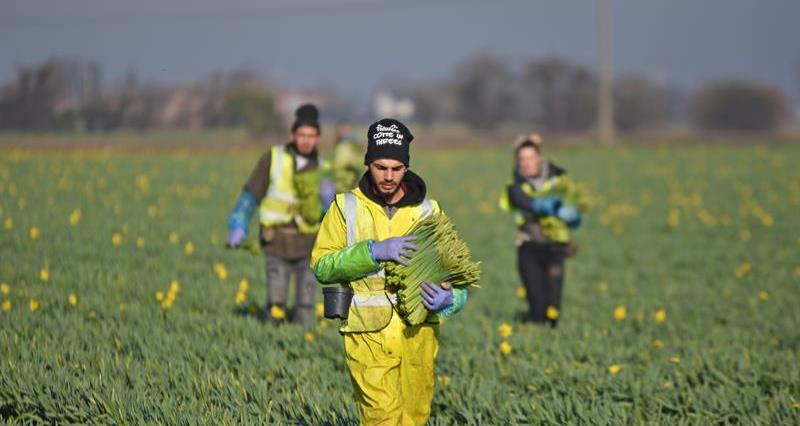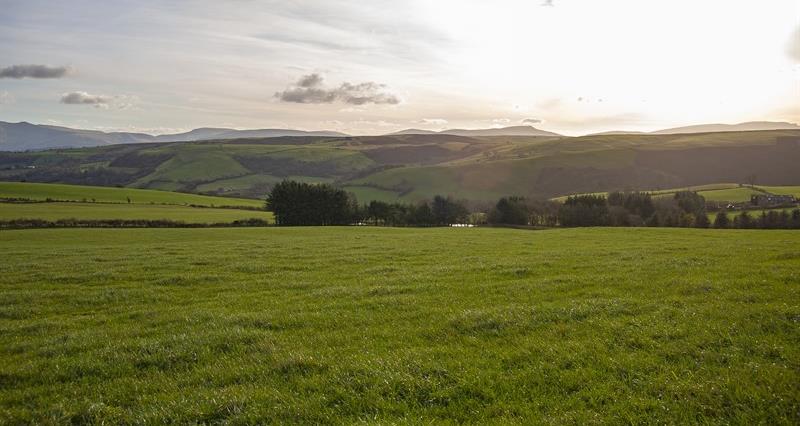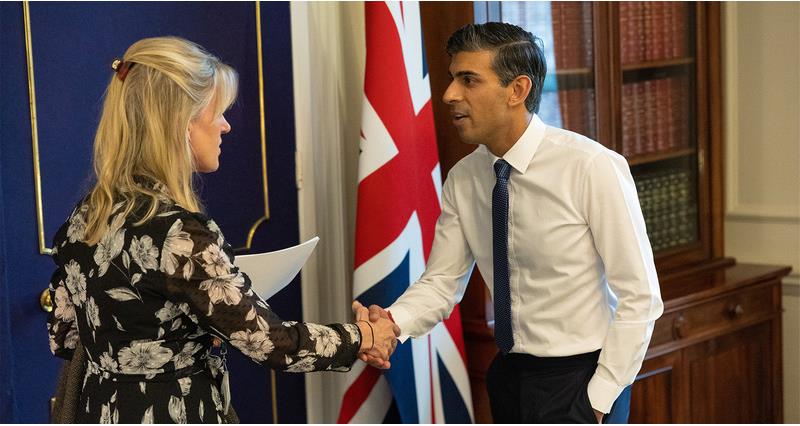Good morning Conference. Well. What a year it’s been since I last stood in front of you. Then, we were nervous about the prospect of war as Russian troops massed on the Ukrainian border. And the day after conference, a year to the day this Friday, the unthinkable did indeed happen.
The images behind me (displayed on screens in Hall 1 during Minette's speech) are testament to the horrific challenges the farmers of Ukraine have faced.
Farms targeted. Fields mined. Animals killed. Crops destroyed.
I have spoken to my colleague, Maria Didukh, and fellow farmers in the Ukrainian National Agrarian Forum regularly, and the respect and admiration I have for them – producing food against the backdrop of such enormous losses – and for the Ukrainian people, knows no bounds.
Remembering Lord Plumb
We ourselves suffered a great loss last year. Lord Plumb.
The memories, stories and anecdotes shared by so many since his passing, and the moving and warm eulogies at his funeral and memorial service, reminded us what a truly compassionate, perceptive and brilliant man he was.
For my part I have always been conscious that I am merely standing on the shoulders of a giant.
Although… there is one area where I recently trumped Henry. As President, he dealt with three Prime Ministers (and when I say dealt with, you understand what I mean!)
When he passed away in April, I had only two PMs to my name. But I’ve now racked up a couple more, which puts me one ahead! I’ll take small victories where I can find them.
Volatility, uncertainty and instability
The unwelcome political turmoil of the past year reflects much of what I’ll talk about this morning – that volatility, uncertainty and instability are the greatest risks to farm businesses in England and Wales today.
Critically, those consequences will be felt far beyond farming. They will be felt across the natural environment, and in struggling households across the country.
Labour shortages and soaring energy prices are hitting the poultry industry, already reeling from avian influenza, as well as horticultural businesses and pig farms.
Meanwhile, other sectors are facing an uncertain future as direct payments are phased out against a backdrop of huge cost inflation, with agricultural inputs having risen almost 50% since 2019:
Fertilisers up 169%. Energy up 79%. Animal feed up 57%.
Despite recent falls, gas prices remain three times higher than ‘normal’.
And the impact of this?
“Despite the challenges, NFU members and the farmers and growers of Britain continue to bring in the harvest, to produce the nation’s food and to keep the country fed through tough times.”
NFU President Minette Batters
UK egg production has fallen to its lowest level in nine years. Which means there were nearly a billion less eggs produced in 2022 compared to 2019.
Production of salad ingredients like tomatoes and cucumbers are expected to fall to the lowest levels since records began in 1985.
And our own survey of livestock producers has found that 40% of beef farmers and 36% of sheep farmers are planning to reduce numbers in the next 12 months, with input costs cited overwhelmingly as the main reason.
This was also the year that the potential impact of climate change really hit home. The extraordinary temperatures we experienced in July – exceeding 40 degrees - topped the previous record by almost a degree and a half.
And while many parts of the country have experienced huge amounts of rainfall recently, impacting farming operations over autumn and winter, some counties remain in official drought status.
Despite all this, NFU members and the farmers and growers of Britain continue to bring in the harvest, to produce the nation’s food and to keep the country fed through tough times.
Increasing numbers to feed
There was another striking milestone reached this year – in November the UN estimated that the world’s population passed 8 billion people. We only passed 7 billion in 2011.
That works out as an additional 200 thousand people on the planet – all in need of food, fuel and fibre - every, single, day.
“Our vision set out three cornerstones on which a prosperous farming sector needed to be built – boosting productivity, protecting the environment and managing volatility.”
Some of you will remember the government’s own Chief Scientist, Sir John Beddington, in 2009, talking about 'The Perfect Storm' – climate change colliding with food, water and energy scarcity.
Well, after the year we’ve had his prediction looks more prescient than ever.
David Beasley, Executive Director of the UN’s World Food Programme, recently warned that, even before the war in Ukraine, worldwide 276 million people were facing acute hunger.
And the number is predicted to climb by an additional 50 million.
Lessons from a difficult year
So as British farmers, there are three key lessons we can take from this extraordinary year.
Firstly, as the global population continues to rise, and parts of the planet become less suited to producing the food we eat, we have an opportunity, and a duty, to get the best out of our maritime climate.
British farmers need to be recognised and valued, first and foremost, as food producers.
Secondly, in the face of climate change we should be unwavering in our commitment to achieving Net Zero, and contributing to our energy security through on-farm renewables generation.
We should be the pioneers of a sustainable approach to farming that preserves the land for future generations, so they can continue as food producers too.
And thirdly, we should never take our food security for granted.
Domestic production key to food security
Food security is not the same as self-sufficiency – we will always rely on imports to some degree, and it is sensible to ensure diversity of supply.
But food security also means ensuring our food is safe to eat, that it can be distributed efficiently, and that it remains affordable.
All of which points to prioritising domestic production.
“The clock is ticking. Time is almost up for this government to start walking the talk.”
The rhetoric of successive governments that ‘we are a wealthy country… we can just import our food’ must be exposed as naïve in the extreme in a rapidly changing and challenging world.
Prioritising domestic food production
Last June saw the publication of the government food strategy – and I have to say, while very late in coming, it was a relief to finally see acknowledgement of the importance of domestic production within the context of food security.
And during his leadership bid, the Prime Minister, Rishi Sunak, committed to a new food security target, including a statutory duty to monitor and report on annual domestic food production levels.
If this were to happen it would be the most significant commitment on food production since the 1947 Agriculture Act.
Looking forward: building on our wins, with action to back up words
This time next year, as we gather for Conference 2024, we will almost certainly be heading towards a General Election, with manifestos being finalised, and politicians getting into campaign mode.
So the clock is ticking. Time is almost up for this government to start walking the talk.
I have lost count of the times I’ve been told by MPs and Ministers – all the way up to Prime Ministers – plural, four of them! – that farming is at the forefront of this government’s thinking.
I am proud of the wins we continue to achieve,
But, more often than not, it has been incredibly hard getting the government to back up its rhetoric with concrete actions.
On trade, we secured the establishment of the Trade and Agriculture Commission, the new Food and Drink Export Council and the placement of eight new agricultural attachés in our overseas embassies.
But this could all have been done six years ago. Instead, the government spent that time prioritising two trade deals with huge agricultural net exporters, Australia and New Zealand.
I’m very concerned about the cumulative impact these deals will have on sensitive sectors such as beef, sheepmeat and sugar.
“British farmers need to be recognised and valued, first and foremost, as food producers.”
And the words of many politicians still ring in my ears that New Zealand and Australia set NO precedent in giving away access to our valued agricultural markets.
So let me be very clear, we are watching - like hawks - the current negotiations with Canada and Mexico, both members of CPTPP - the regional Trans-Pacific Partnership – which the UK is hoping to join this year.
Closer to home, while I am pleased to say there has been some progress on ELMS in recent weeks, it is stuttering and partial progress, and there is a worrying lack of transparency on how the budget is being spent.
This is not just about supporting our food security, but safeguarding our traditional, rural communities, and breath-taking, iconic landscapes in some of the most challenging areas of the country.
Again, we should not be in this situation after more than six and a half years since the EU Referendum.
And when it comes to exporting to our neighbours in the EU, our farmers face the full gamut of EU controls while, three years on, we fail to apply the same level of controls on their imports.
It’s not just an issue for competitiveness, but also for our critical biosecurity. 10 years on from the ‘horsegate’ scandal we cannot afford to be so complacent about the risks that continue to exist.
And what about labour shortages – we have thankfully secured another annual increase on the seasonal worker scheme to 45,000 in 2023, with the potential to increase to 55,000 if the demand is there – but just getting that has been enormously hard.
Backing British farming to feed a changing world
So, the time is nearly up for government to demonstrate its commitment to food and farming in our great country. Not just by saying they support us, but by showing us they do.
And I won’t let the opposition off the hook either – the rural vote will be crucial in the next election, and farmers are watching all parties closely.
“Food security means ensuring our food is safe to eat, that it can be distributed efficiently, and that it remains affordable.”
A plan for action – on productivity, environment and volatility
So what does this action look like. What are the key priorities that provide the means of securing a sound future for British farming?
Almost six years ago we set out our Vision for the Future of Farming, recognising the enormous changes that we would be going through in the years ahead – even without predicting a global pandemic and war in mainland Europe.
Our vision set out three cornerstones on which a prosperous farming sector needed to be built – boosting productivity, protecting the environment and managing volatility.
These remain the cornerstones on which any government should build policy – not just specific agricultural policy, but all policy areas that touch on farming, food and the environment.
On productivity
Better productivity is critical, not only in maintaining viable and profitable food producing businesses, but also in delivering net zero and resource use efficiency.
The NFU is at the forefront of this work – as you will see with the launch of our sector resilience plans tomorrow.
Hard action is needed in a number of specific areas:
On recent visits to NIAB and the Cambridge Crop Science Centre, I was struck by the opportunities we now have to deliver a step change in the productivity of UK agriculture through the application of science into practice.
This needs well-functioning and well-funded public sector Research and Development.
I hope the recent creation of a new Department for Science, Innovation and Technology signals a renewed commitment on this, including commercial adoption of new technologies on farm.
The progress of the Precision Breeding Bill through Parliament is welcome and should send a signal to the research and technology sectors that in England we are ready to embrace vital new technologies.
Which takes me to my second area for action on productivity - a business friendly and responsible Regulatory Environment which prizes more specific, pro-innovation and less burdensome regulations.
As with many other business groups and environmental NGOs, we believe the government’s current programme to review all Retained EU Legislation – of which there have been over 1700 individual pieces relating to Defra’s work alone – is ill-judged.
It will mean a rushed job, giving Ministers sweeping powers to re-write regulations with little parliamentary oversight. I am equally worried that areas ripe for reform will simply be retained given the time constraints in making judgements on them.
The government should abandon the timetable – which expires in just 10 months – and instead set out a realistic timeline for reviewing EU regulation – one that achieves a better balance between the important safeguards regulation provides and the innovation and productivity it can sometimes stifle.
In addition to R&D and regulation, the government must take action on taxation, infrastructure and planning to maximise the prospects for investment in UK food and drink businesses.
We know the UK is the most prized food market in the world. Our farmers and growers must remain the number one supplier of choice, in retail, in out-of-home and in public procurement.
And we want to increase our markets overseas, getting the most out of the new Food and Drink Export Council, other bodies like the dairy Industry Export Taskforce, and our new attachés, to help realise our ambition to grow exports by 30% by the end of the decade.
On the environment
Farmers are Britain’s working conservationists.
There are two key ways we can overcome one of the fundamental challenges they face in reaching their potential – that the market does not effectively reward positive environmental action by farmers.
Firstly through the development of new government schemes, for instance ELMs in England, and the Sustainable Farming Scheme in Wales.
And secondly through the development of new environmental markets.
In England, the recent publication of the ELMs prospectus provided much needed detail in some areas, it still falls short in others.
ELMS must reward environmental outcomes that are not land-based, so sectors such as horticulture can help deliver net zero.
The lack of scientific rigour and transparency in the co-design process needs to be addressed.
There should be clear rules so that new options in SFI and Countryside Stewardship are compatible and can be stacked.
And payments must move away from the principle of income foregone, which offers little incentive, especially in some sectors and geographies.
Alongside ELMs, the development of voluntary environmental markets should provide an additional opportunity for farmers to contribute to the nation’s net zero, biodiversity and water quality aspirations.
The NFU is playing a key role in this vitally important area. My own farm, back home in Wiltshire, is involved in the environmental farmers group, bringing farmers together to protect and enhance nature over a whole catchment of 50,000 hectares.
And last week we saw the creation of the first upland group, Peakland Environmental Farmers, involving 53 farmers over 26,000 hectares of upland in the Peak District National Park. These are driving forward farmer-led, farmer-owned environmental trades in areas such as water quality, biodiversity and carbon sequestration.
At the same time, with the recent launch of the Environmental Improvement Plan, the government must reconcile its often contradictory and conflicting approach to land use and environmental policy, matching it with far more ambitious plans for our food production so that we do not risk the UK’s food security.
We also need action on trade and standards.
Nearly three years ago over 1 million people signed the NFU’s petition calling on government to ensure our high environmental and animal welfare standards are not undermined by new trade deals.
We made progress with the establishment of the Trade and Agriculture Commission, but alongside the TAC we called for a set of “core standards” for food imports.
We have heard nothing from government on this – a concern shared by bodies across the farming, animal welfare and environmental sectors.
Again, it’s time for our government to demonstrate commitment to our food and farming standards with actions, not words.
On volatility
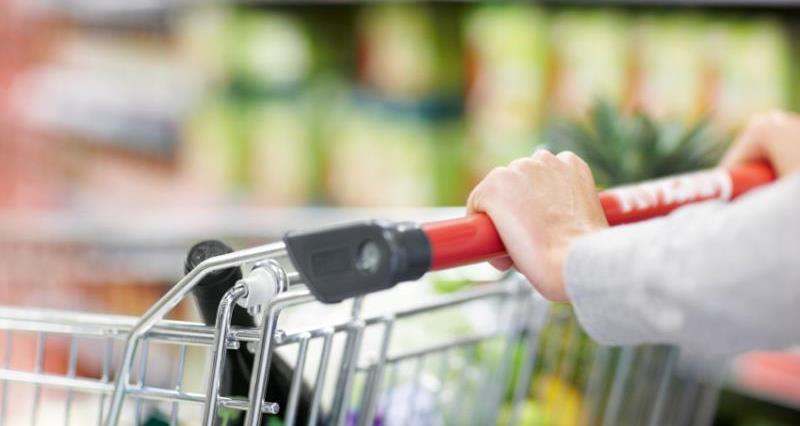
Before Christmas, against a backdrop of empty supermarket shelves and real public concern, I called an emergency press conference – alongside a number of industry representatives of our hardest hit sectors: pigs, poultry, dairy and horticulture.
We had to call out government inactivity and lack of responsibility throughout the supply chain - from retailers to processors and packers - on energy costs and workforce shortages.
It is a simple fact that it is not sustainable for farmers and growers to continue to sell below the cost of production.
I am very concerned about the current consultation on the future of the Grocery Code Adjudicator. The GCA’s role in policing compliance with the grocery code and in holding retailers to account has never been more important.
Merging it into the Competition and Markets Authority would dilute its power and effectiveness. Instead, I believe the GCA’s powers should be expanded.
Ultimately, farmers and growers must get the fair return their hard work justifies.
The Prime Minister assured me, when I met him in No 10, that he would convene an annual food resilience round table. This is something I have pushed for forcefully and I will make sure, when it does happen, it is more than just a talking shop.
Because once again, on addressing and managing volatility and building resilience, we need action not words.
We have called on government to use the exceptional market conditions powers in the Agriculture Act – and if these aren’t exceptional market conditions, what are?
There must also be dedicated support for the energy intensive sectors of agriculture and horticulture. While the government has such a scheme covering other industries, no farming or growing business qualifies. They ought to, and I have made this clear in my letter to the Chancellor ahead of the Budget next month.
The situation seems ridiculous. The Royal Botanical Gardens , as important as they are, qualify for the scheme. But the protected crop sector – those growing tomatoes, cucumbers, aubergines and peppers to feed British families – don’t.
And bringing all this together, we need a joined-up approach to managing supply chain volatility.
The government have taken action on energy security, introducing a Future Systems Operator to manage net-zero’, security of supply and energy efficiency. Its time they took the same, serious attitude to food security.
Government should establish a Food Intelligence Unit to highlight the forward risks facing the food sector and to make recommendations to Ministers.
Government must commit and deliver
Conference. I finish where I started – reflecting on an extraordinary year that reminded us of the fragility of a world we’d come to take for granted.
The clock is ticking.
It’s ticking for those farmers and growers facing costs of production higher than the returns they get for their produce.
It’s ticking for the country, as inflation remains stubbornly high and the affordability and availability of food come under strain.
It’s ticking for our planet, as climate change necessitates urgent, concerted action to reduce emissions and protect our environment.
And it’s ticking for government – to start putting meaningful, tangible and effective meat on the bones of the commitments it has made.
Commitments to promote domestic food production.
To properly incentivise sustainable and climate friendly farming.
To put farmers and growers at the heart of our trade policy.
To guarantee our food security.
And to Back British farmers and British food.
The NFU will always stand tall as a constructive partner in achieving those commitments.
But commitments need to be delivered.
And the time to deliver them – together – is now.
Thank you.
Watch again
Find out about Minette's areas of responsibility at the NFU
Minette Batters
Former NFU President
Diversification includes the conversion of a 17th century tithe barn into a wedding and corporate events venue, and horse liveries. Minette co-founded the campaigning initiatives 'Ladies in Beef' and the 'Great British Beef Week'.
Campaigning on behalf of NFU members about the importance of British food and farming has been a key driver for Minette throughout her time at the NFU. In 2020 she led one of the most successful petitions ever, bringing together a coalition of chefs, including Jamie Oliver, farmers, environmentalists, consumer groups and animal welfare experts – resulting in over one million people signing the NFU food standards petition. She has also regularly engaged with different media genres including appearances on Desert Island Discs, Question Time, and Any Questions.
She has been an NFU member from grassroots through to County Chair; she served as Wiltshire’s Council delegate and also as Regional Board Chair for the South West. Minette has also been a member of NFU Governance Board and served as NFU Deputy President for four years from 2014 to 2018, before being elected as president in February 2018. Minette is also an ambassador of Farm Africa and was made a Deputy Lieutenant to Her Majesty Queen Elizabeth in 2021.
Officeholder responsibilities
- Trade and standards
- EU and international relations
- Taxation and fiscal policy
- Science and research and development
- Food supply chain (fair dealing, Markets and Authorities, competition, regulation)
- Food service
- AHDB
- Levelling up
- Education
